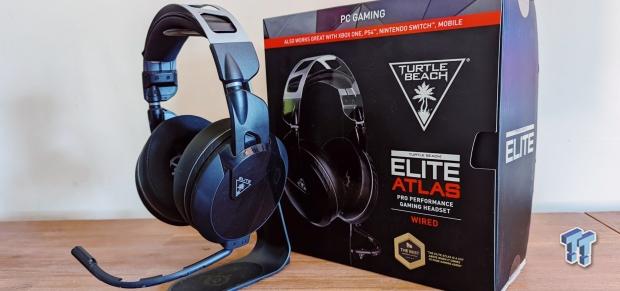The Bottom Line
Pros
- + The great out-of-the-box sound that is balanced and detailed
- + Sub-bass action adds a lot to several games
- + Comfortable cushions make for a great fit
- + The long PC splitter cable adds desktop rig functionality
- + Stylish and robust build
Cons
- - Headset adjustment is lacking and done via plastic
- - Voice quality is good but low-volume by default
- - The microphone, although detachable, is longer than it needed to be
- - No software support means customization can be a pain on the PC
- - Inline controls are plasticky and cheap
Should you buy it?
AvoidConsiderShortlistBuyIntroduction & Specification Details and Close-up
Throw the word 'Pro' into the description of a product, and there's a certain level of expectation on the part of the user. When it comes to peripherals and gear designed for gamers, that expectation then bleeds into the realm of esports or pro-player grade precision. For your typical gaming headset, a 'Pro' bit of kit should be comfortable and tuned to deliver clarity across the entire frequency range, not to mention include clear chat functionality without any issues or distortion.
Plus, deliver functionality or support to make sure things like weapon reloads and footsteps come across clearly when playing any number of competitive FPS titles.
The Turtle Beach Elite Atlas Pro Performance Gaming Headset lives up to its namesake in a lot of ways, delivering on the comfort front and certainly when it comes to audio quality.
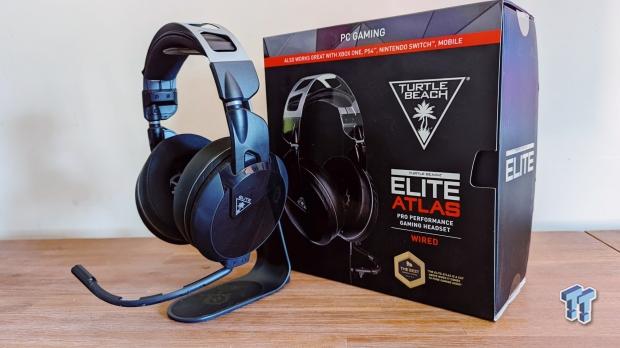
As per the namesake, you can probably put two and two together that the Turtle Beach Elite Atlas is the wired version of the Turtle Beach Elite Atlas Aero wireless gaming headset we recently reviewed. And with that little bit of knowledge, you might think that we'd be able to copy and paste all the results and insight from that write-up and simply add "wired not wireless". But there are a few key differences, namely when it comes to the look and feel and overall build. Where the wireless Atlas Aero was chunky, weighty, and featured a tight fit that impacted comfort over long sessions, the wired Elite Atlas is far more comfortable and lightweight.
And being wired, it doesn't feature any of the software issues we ran into, on the account of it not requiring any to work. With both a standard 3.5mm jack and long PC splitter cable, it's great to use no matter if your platform of choice too - whether that's something that sits next to a TV or is a rectangle box full of pulsating RGB lighting connected to a monitor. The good news is that the Turtle Beach Elite Atlas features the same impressive drivers and tuning found in the wireless edition, delivering a great out-of-the-box sound that won't have you looking for a third-party app to make any sort of EQ adjustments.
Specifications & Close Up
- Product Type: Wired Gaming Headset
- Interface: Wired 3.5mm and PC Splitter Cable
- Supported Platforms: PC, PlayStation 4, PlayStation 5, Nintendo Switch, Xbox One, Xbox Series X|S
- Drivers: 50mm Nanoclear speakers with Neodymium Magnets
- Headphones Frequency Response: 12 - 20000 Hz
- Microphone Pick-up Pattern: Unidirectional gaming microphone
- Surround: None
- Cable: 3.5mm audio cable, PC Splitter cable
- Ear Cushion: Over-Ear (Closed), Athletic Fabric, Leather & Memory Foam
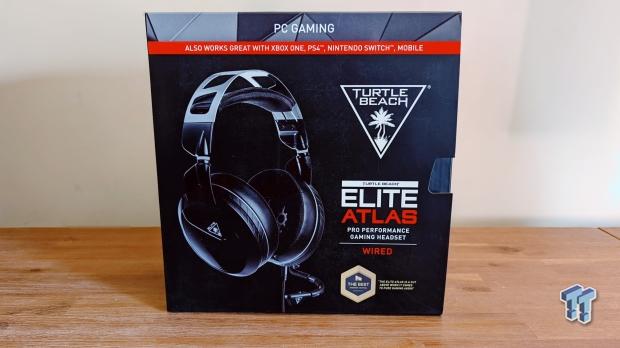
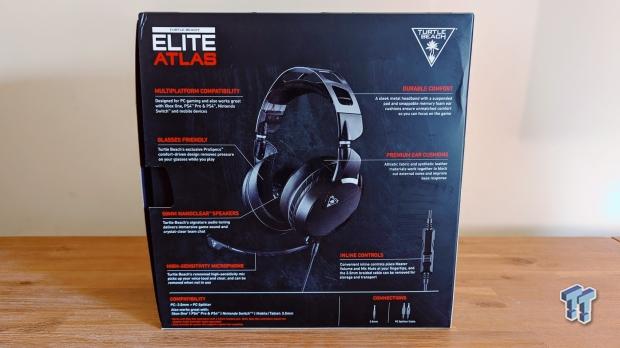
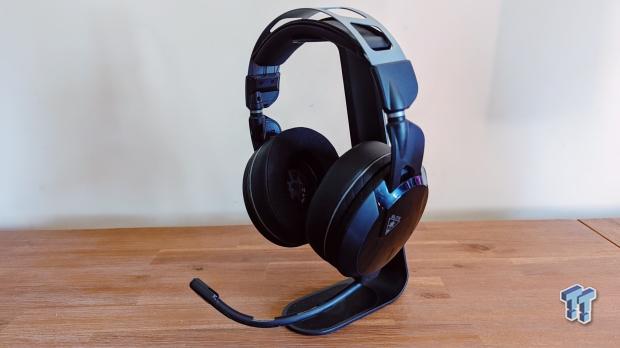
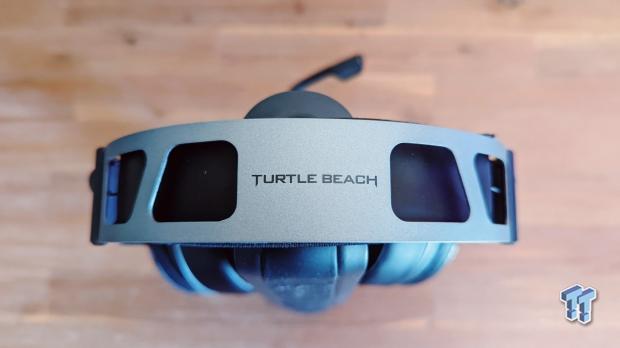
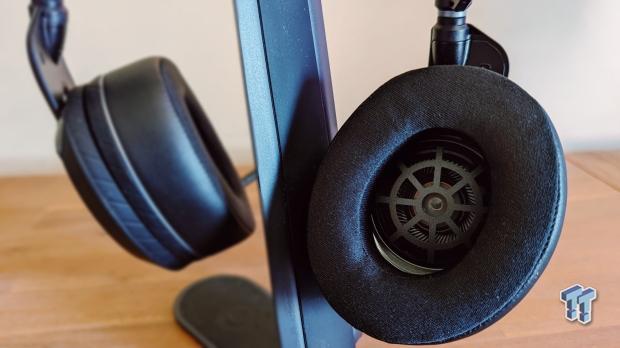
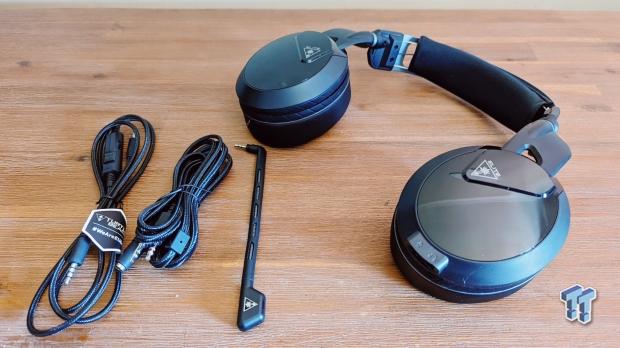
Kosta's Test System Specifications
- Motherboard: MSI MEG X570 UNIFY
- CPU: AMD Ryzen 5 3800X
- GPU: NVIDIA GeForce RTX 3090 Founders Edition
- Cooler: Cooler Master MasterLiquid ML240R RGB AIO CPU Cooler
- RAM: 32GB (4x8GB) HyperX FURY DDR4 3200MHz
- SSD: Seagate FireCuda 520 SSD 2TB
- Power Supply: Cooler Master V 850W Gold SFX Power Supply
- Case: MPG SEKIRA 500P
- OS: Microsoft Windows 10 Pro 64-bit
Design & Software and Support
Design
Although Turtle Beach doesn't like to include the weight of its headsets as part of its product spec sheets, the good news is that the Turtle Beach Elite Atlas weighs considerably less than the 400 grams or so of the Turtle Beach Elite Atlas Aero. The immediate benefit is less fatigue for long gaming sessions, which is further bolstered by the supremely comfortable cushions Turtle Beach has whipped up for the Elite range. Soft memory foam blends fabric and leather, with the impressive Pro-Specs glasses that ensure the same seal and fit even if you are of the bespectacled persuasion.
The cups are magnetic and replaceable, if need be, much like the wireless Aero. But that's kind of where the similarities end, and although this might be a personal preference, the Turtle Beach Elite Atlas is more stylish in its look and feel. The cups feature a reflective finish that is less garish than the grills on the Aero and blends a lot nicer with the metallic headband.

That said, there is one slightly strange design choice that is a little different than what we're used to with gaming headsets aimed at the 'Pro' level, and that comes with the adjustment. Instead of a metallic band that fits in the headband and earcup, you've got the plastic near the hinges that extend above the ear slightly. For a lack of a better term, there's not a lot of headroom provided with the Turtle Beach Elite Atlas, so much so that it's one of that rare try-before-you-buy headsets purely to see if the limited adjustment on offer hits the right sweet spot you're looking for.
As a wired headset, the controls are on the 3.5mm cable and are limited to a microphone mute switch and a volume dial. Even though the 3.5 cable (and PC splitter) is braided, thick, and of high quality, the inline controls are plasticky and feel cheap. The volume dial is particularly unimpressive and too small to offer up the tactile volume control needed for making minor adjustments. No microphone controls feel like a missed opportunity, too, as that leaves all balancing and other elements to console system software or whatever audio apps you might have installed on your PC.
But it's worth pointing out again that the long and high-quality PC splitter cable provided is a great addition - and one we'd love to see Turtle Beach provide as standard.
Software and Support
Yeah, the PC splitter cable provided in the Turtle Beach Elite Atlas is one of the best we've encountered and long enough to reach a desktop rig, no matter if it's on a desk or nearby on the floor. But PC functionality kind of ends there, and much like when you connect the 3.5mm jack to an Xbox or PlayStation controller, you're limited to whatever features are on offer. For consoles, this isn't an issue, on the account of both PlayStation and Xbox providing robust cha-mix, volume, and even surround customization that's easily accessible.

It's a little different on PC. If you simply connect the Turtle Beach Elite Atlas directly to your motherboard or laptop, you're mostly limited to Windows 10 audio customization, which is fine but not amazing. Messing around with microphone and chat settings on PC is kind of done on a per-app basis if you don't have a specific audio suite or dedicated fully-featured sound card, so without an official PC app - getting the most out of the Turtle Beach Elite Atlas can be a little cumbersome.
Performance & Microphone
Performance
Turtle Beach's impressive 50mm Nanoclear drivers feature great out-of-the-box tuning for games, music, and other media - where you get rich, booming bass, clear mid-range detail, and crisp highs that don't sound overly harsh or overpowering. And with a frequency response of 12 - 20000 Hz, there's room for the rattle and rumble of sub-bass, something that adds quite a bit to a lot of games.
Take the first-person Cyberpunk-inspired Ghostrunner on PC and console. The Turtle Beach Elite Atlas not only sells the stereo clarity of parkouring across a rainy rooftop dodging incoming projectiles, but there's enough room to cater for the narration and downright awesome pulsating synth-wave soundtrack.

This level of detail carries across to music too, which showcases the warm, balanced sound of the headset. Now, it's worth mentioning that when testing, we did so with a dedicated external sound-card switching between 24-bit/48 kHz and 16-bit audio. For those that connect their headset direct to onboard audio (via a PC motherboard or laptop jack), the quality can suffer. A lack of software for a wired headset is mainly the by-product of not having to provide a driver and hardware that handles all the DAC stuff. Wired offers a pure signal, one entirely controlled by the hardware it's connected to.

With excellent channel separation for the stereo sound on offer, playing titles like God of War, Marvel's Spider-Man, and the Ghostrunner provides enough clarity and detail that you don't miss the fact that there's no official surround support.
On PC and Xbox, there's Windows Sonic that offers up okay spatial surround, but you'll need something like a Dolby Atmos subscription to take advantage of the surround sound potential. With the great default sound, the Turtle Beach Elite Atlas is certainly surround-ready, and on PS5, you can tap into the console's Tempest 3D Audio which sounds great.
Microphone
Unfortunately, like with the wireless Atlas Aero the microphone and chat performance of the Turtle Beach Elite Atlas is good but not great - and not something you'd call broadcast quality. The default recording volume is also a little on the low side, but it does capture the low-end frequencies of voices, on top of the high-end, so you don't get that tinny sound often associated with game chat.
The good stuff, though, comes with Turtle Beach's Truspeak tech, and that's a form of noise-canceling that does away with most background and other ambient noises in favor of picking up your voice. And it works. If there's one bit of criticism we'd place on the microphone is that its length feels a tad long and sits a bit far from your mouth - which might account for the low volume.
Final Thoughts
Compared to the wireless Turtle Beach Elite Atlas Aero, the baseline Turtle Beach Elite Atlas is a sizable improvement even though it's smaller and lighter. And sure, without it being wireless, you miss out on any sort of official software support on the PC side and must deal with cables, but the audio quality is excellent. The fit is comfortable, the cushions are great, and the physical design is an improvement over the chunky Aero.
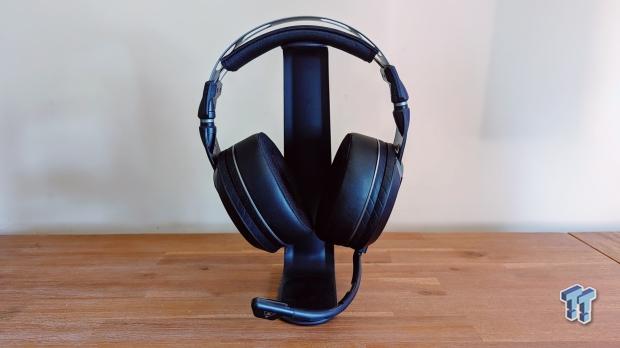
The wired route also means it's more affordable. It's not perfect, but there's a lot to like about the Turtle Beach Elite Atlas as a headset that you can connect to a gaming PC or a console. Great sound and comfort go a long way when they're on equal footing.

